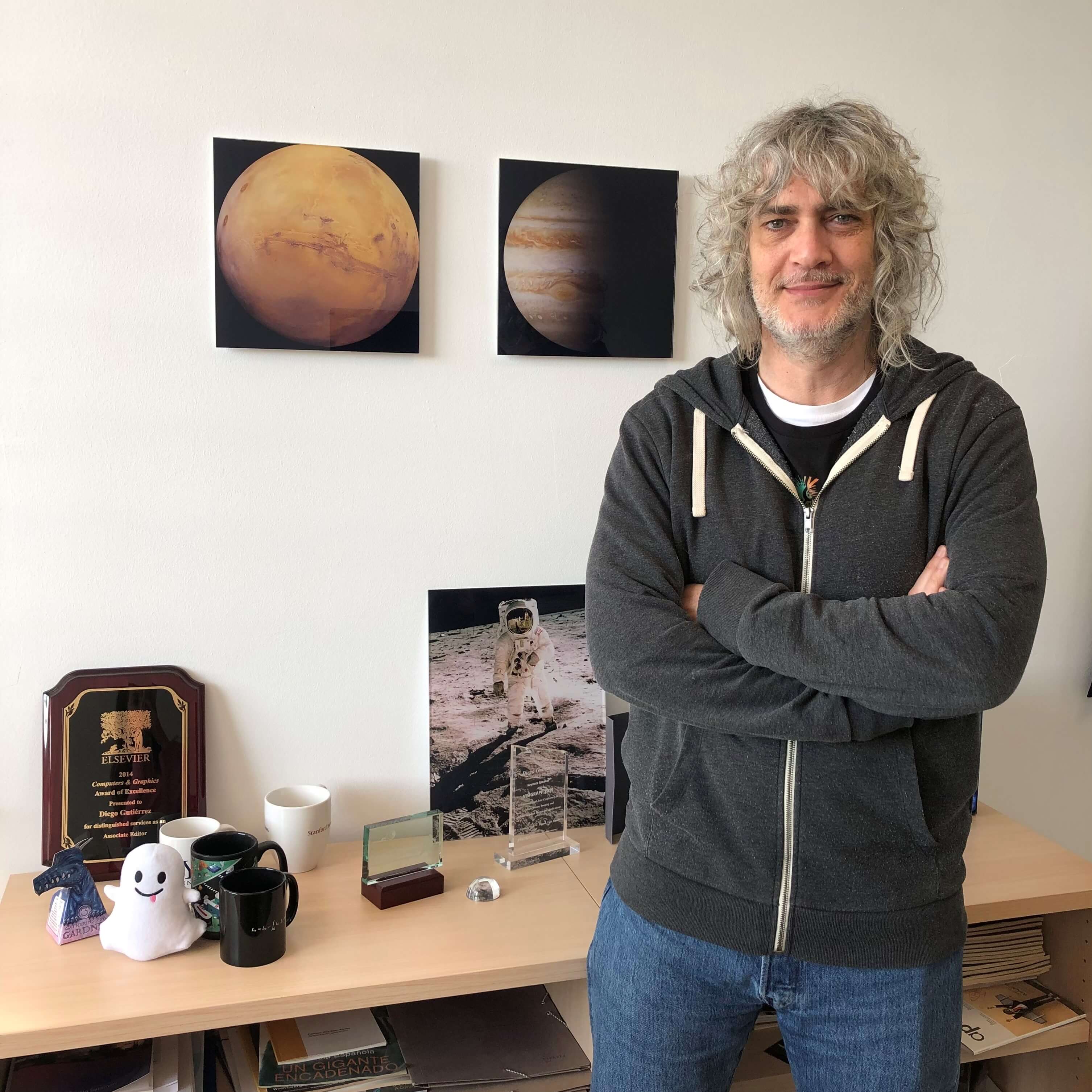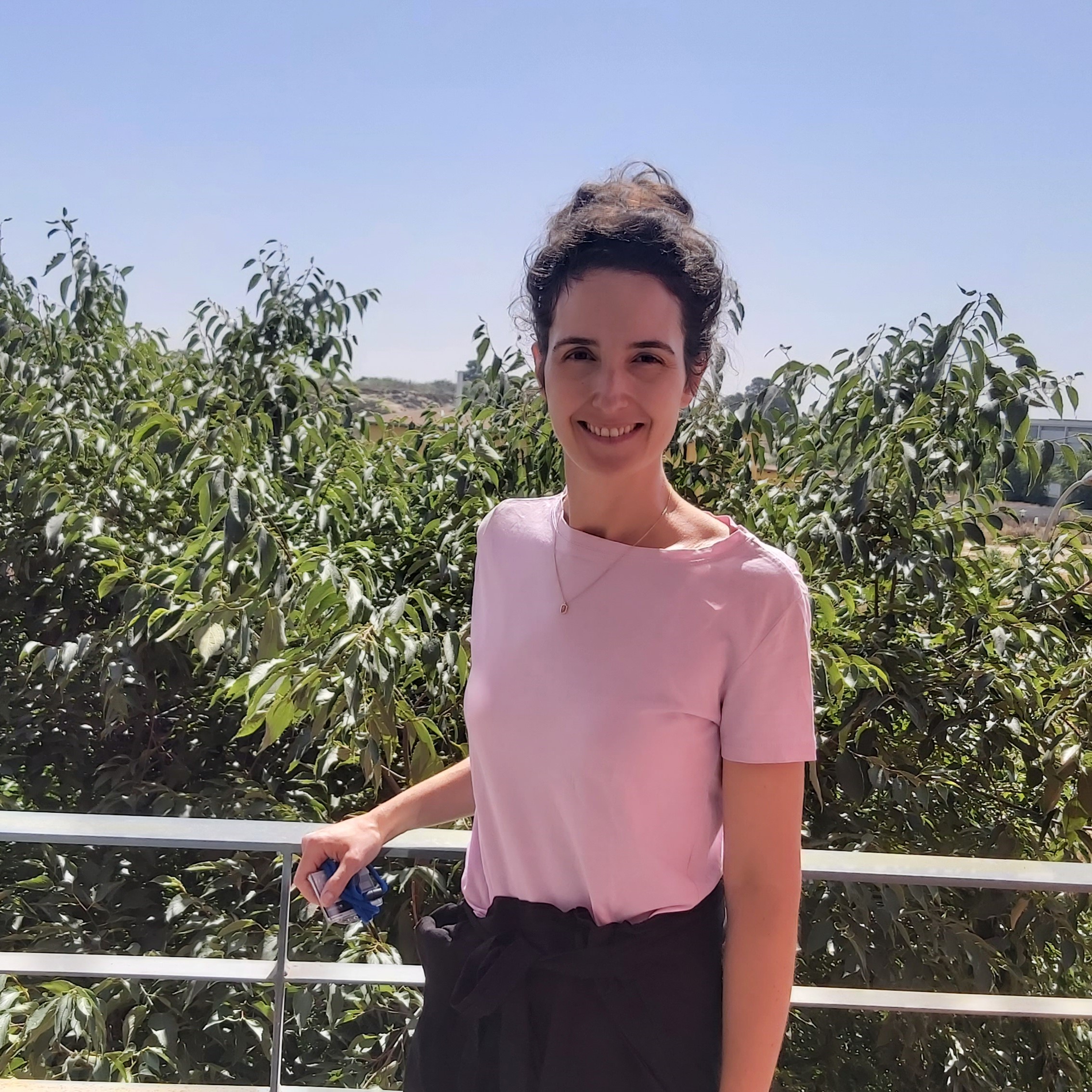
Diego says he has been able to achieve much more than he thought he would when he started his career, but he says that all his achievements are thanks to the great group that works with him, which keeps his race to reach new goals and projects going.
Why did you decide to go into research?
I can't say it was vocational. I was an industrial engineer because that was what everyone else was doing and it was the only engineering there was in Zaragoza, but when I finished I realized that I didn't like it very much. Then I went into research, in Paco Serón's group, and I saw that I liked it more. But I started very late, I started my thesis when I was 32 years old.
You weren´t clear about what you wanted to do...
Not at all, but it's very rare for an 18-year-old to be clear about what he wants to do.
You created the Graphics and Imaging Lab research group, what do you research there?
We have several lines open. The first is computer graphics, which is the generation of synthetic images, created by a computer. For example, video games or cinema. We also work on Virtual Reality.
The other major line is computational imaging, which tries to capture visual information from the real world, but using computation to overcome the limits of physics in that capture. With computation we are able to retrieve enough information to reconstruct scenes that are not visible. The clearest example we are working on in the last few years are cameras that are able to see what is around the corner. Objects that are hidden but somehow you could photograph them.
Some project that you would like to highlight.
In terms of dimension, I would highlight two. The ERC Consolidator Grant that I was given in 2016, and that has to do with issues of information graphics, virtual reality, perception... This was 1.7 million, it ends already in April, but we will continue working on those lines. Now in December we have started another European project of 1.4 that has to do with computational imaging and can have a very extensive range of application.
In the end you create a very good large group structure, but then you have to maintain it. That's why I'm always thinking about the next project.
The I3A has aspirations, has ambition
How long have you been associated with the I3A?
I don't know about the official link. But for me since always... about 20 years, but I can't tell you exactly. I have worked in many places, but my official affiliation has always been with Unizar/I3A.
Some thing that you would highlight about the institute.
On a professional level, the I3A has aspirations, it has ambition. On a personal level, it is a pleasure to work with people from the Institute. In general, in many institutes there is usually friction between researchers, or with the administration people. But in the I3A I have never found that. I always say that there are two ways of approaching a problem: they listen to you and say let's see how we can solve it, and the other is that they listen to you and say it can't be done. The I3A has always been like "let's see how we can solve it" .
There is a lot of local talent that we capture and we give them opportunities.
What do you like most about your profession and what do you like least?
What I like least is the bureaucracy and the fact that no politician really takes research into account. They make generic laws without thinking about the casuistry of research and then you find that these laws are very difficult to apply in our field.
What I like most is constantly learning things. Knowing that you are creating new knowledge. And also knowing that, somehow, there is a lot of local talent that we give opportunities to, working from here in Zaragoza, can make a name for themselves and an outstanding career at international level. Some decide to stay at the University, and others end up in top companies like Amazon, Adobe, Facebook or Disney. Being able to help that is a luxury. Three years ago we launched the master's degree in Robotics, Graphics and Computer Vision, which is working very well and allows us to attract talent that otherwise might have to leave to do research elsewhere.
What would you say to anyone who is thinking of going into research?
I would encourage them to do it, and I would try to paint as realistic a picture as possible. It's not all negative, it's not all positive. It's a job that gives you a lot of freedom, but there are going to be peaks and valleys. A university career has its difficulties, it's hard to get one step, then another and another, but with patience and hard work you can get there. Besides, someone tell me which is the perfect job in which there are no things to improve.
Up close...
A dream: I don't want to sound pretentious, but we have achieved much more than I thought we would. On a professional level, I would never have thought of forming a group like this... the people I am lucky enough to work with are incredibly talented. We have managed to publish in Nature, something I would never have imagined... or in SIGGRAPH, the best international conference in the field... My goal when I started was to publish a paper there one day, now we have more than 30. Our work is used in academic and professional fields, we have created DIVE Medical, a start-up for the early diagnosis of visual pathologies in babies... The merit of all this is shared, but of course there is a lot of work behind it. There are always new goals to achieve, but in that aspect I am calm.
What do you do in your free time: What is free time? (laughs) I like to play sports, watch a series, read, travel.
A book: Difficult... Blindsight for me is the best novel about first contact with an extraterrestrial civilization, a subject I've always liked.
A movie: American History X or Memento, for example.
Favorite musical group: Metallica
A place: Southeast Asia, from India to Thailand, Cambodia...
How would you define yourself?: I think I'm very tenacious. That can be a positive or a negative thing, but overall I think it has helped me in my career.
